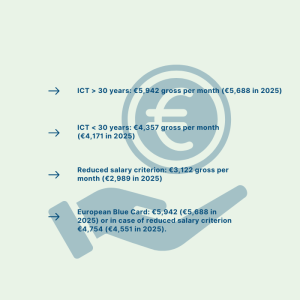20 May 2021, The Netherlands – A new day starts and you receive an email or phone call that your relocation to The Netherlands is confirmed! You are excited, but also a bit nervous about what this new adventure will bring. The Netherlands, that liberal country with the very tall and direct people in North Western Europe, what more do you need to know?
Evidently, you may have learned more about The Netherlands already than what is mentioned above. However, even the most experienced movers may find themselves surprised by the Dutch culture.
With this in mind, we selected five aspects about the Dutch culture which could help you understand your new environment a bit more.
- The part time country
Family time and off-days are everything. You may come from a culture where working 40 hours or more a week is the norm and making extra hours is quite common. Well then, prepare yourself for a small business culture shock. By the end of 2020, almost half of all working people in The Netherlands had a part-time contract. This is visible in all types of companies throughout the country, so don’t be surprised when some of your (Dutch) colleagues work part-time. Get familiar with ‘’papadag’’ and ‘’mamadag’’ which literally translate to: Fatherday and Motherday. These should not be confused with the holiday though. Actually, these are, terms that the Dutch use for a day in the week where the father or mother stays home to take care of their child.
Employers are very much familiar with part-time concepts so feel free to address it and claim that day of spending time to pick up your hobbies or to spend time with your child.
- “Yes” is yes for the Dutch
In general, Dutch people tend to take verbal communication quite literally. “Yes” is yes for the Dutch, what else can it be? To you, responding to a certain question with ‘’yes’’ could simply be a way of confirming that you heard the other person or that you just want to be friendly. However, a Dutch person simply assumes that you agreed to their suggestion or invite and counts on you.
This could be explained by the utter honesty most Dutch people tend to apply. To them, a conversation should be held in honesty and they place confidence in your honesty too. It is always good to clarify whether you really mean yes or if you need some time to think, to avoid confusion.
So, remember, when saying yes to a Dutch person you may have just bound yourself to an agreement, or a cup of coffee!
Bear in mind that the Dutch also appreciate a good cup of sarcasm and humour – they are not going to hold it against you when you said “yes” to something that was actually an intentional joke, but they for sure love to remind you of that joke until the end of time.
- A life full with agendas
Dropping by spontaneously and unannounced is something that exists in the vocabulary of a few Dutch people. But even close relatives or friends will contact each other before visiting. Although this may sound like the agenda of the Dutch is always filled up to the minute, this is not the case. They truly enjoy meeting new people and giving you a hand when you’re in need, but they prefer to know when people stop by so they can prepare themselves for entertaining their company.
Therefore, if you have a Dutch neighbour or colleague who you want to connect with, try to start with some small talk first and when the time is right: ask them for their phone number. When you want to drop by for an ingredient you are missing or just to spend some time with them, you can then easily call them first to give a heads up. Dutch people will certainly appreciate it!
- Employee involvement
From a young age, Dutch people are taught to be assertive and have opinions about any topic. This results in a very open business culture where the input of employees is valued. An employee will be encouraged to share their thoughts on a certain topic and preferably come up with a solution to a possible problem themselves. This is typically more the case for smaller companies as there is generally less hierarchy, but even big companies run projects where employees are involved with innovation of the business.
- A paracetamol for everything
If you ever visited a GP or doctor in The Netherlands already, you probably recognize this: when you mention flu symptoms such as a fever, nausea or a headache, your GP just advises you to take a paracetamol, take a rest and wait a few days to see if the symptoms disappear.
The Dutch also do not have a specific medicine for a cold, as they all take a paracetamol when having mild symptoms and this is a non-prescription medicine.
A good expression that characterises the Dutch health care: there is a paracetamol or aspirin for everything!
Therefore, when visiting a doctor in The Netherlands it is good to always be as specific as possible about your symptoms – or dramatic even. Never downplay your symptoms, as doctors don’t shy away from sending you home, or to the Etos for the medicine. Strange, but true!
Even after reading all these points about Dutch people, maybe you still find their ways a bit hard to grasp and raise your eyebrows every now and then. Give yourself some time getting familiar with all the particularities the Dutch have and soon you will find yourself appreciating a thing or two this beautiful culture has to offer!
Our team at PIRGROUP consists of different nationalities and is culturally diverse and aware. We are more than happy to clarify any question you may have and to guide you with a smooth start of your stay in the Netherlands. Feel free to contact us at the phone number +31 (0) 85 – 620 4900. We would be more than happy to answer your questions!
By Manouk Sinnema, Relocation & Immigration Consultant at PIRGROUP The Netherlands.


